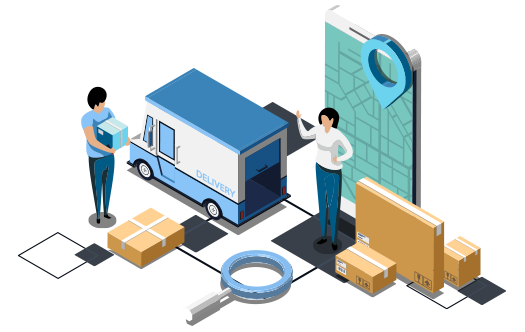Certification Program in E-commerce Supply Chain Management
Get Supply Management Certified. Earning Supply Chain Management certification helps you achieve faster with fewer resources by empowering you with skills that give you an edge over the competition.

Certification Program in E-commerce
Supply Chain Management
Get Supply Management Certified. Earning Supply Chain Management certification helps you achieve faster with fewer resources by empowering you with skills that give you an edge over the competition.
Certification Program in
E-commerce Supply Chain Management
Get Supply Management Certified. Earning Supply Chain Management certification helps you achieve faster with fewer resources by empowering you with skills that give you an edge over the competition.
Why Ecommercesity for Supply Chain Management Program?
by Industry
Experts
Industry Experts
Job Placement
Assistance
Placement Assistance
Training on
OMS Panel
on OMS Panel
of E-commerce Brands
of E-commerce Brands
Learning with
Live Projects
with Live Projects
Hiring
Partners
Hiring Partners
Learning
Schedule
Learning Schedule
Overview of E-commerce Supply Chain Management Program
Overview of
E-commerce Supply Chain
Management Program
By being an E-commerce Supply Chain Management Expert, you can also become..
▶ Multi-Channel Operations Manager
▶ Order Efficiency Expert
▶ Customer Experience Specialist
▶ Business Growth Master
▶ Inventory Management Expert
▶ Warehouse Automation Architect
▶ Business Scalability Specialist
▶ Smooth Operations Manager

What Does This Supply Chain Management Course Have to Offer?
 Fundamentals of Supply Chain Management
Fundamentals of Supply Chain Management
Understanding the basic principles, concepts, and components of supply chain management, including procurement, production, warehousing, transportation, and distribution.
 Supplier and Vendor Management
Supplier and Vendor Management
Understanding the role of suppliers and vendors in the e-commerce supply chain, evaluating supplier performance, managing supplier relationships, and optimizing sourcing strategies.
 Transportation and Freight Management
Transportation and Freight Management
Examining transportation modes, freight forwarding, carrier selection, and freight cost optimization techniques to streamline shipping operations and minimize transportation costs.
 Reverse Logistics and Returns Management
Reverse Logistics and Returns Management
Developing skills in managing product returns, handling reverse logistics processes, and implementing efficient returns management strategies to reduce costs and improve customer satisfaction.
 Supply Chain Technologies
Supply Chain Technologies
Familiarizing yourself with supply chain management software, e-commerce platforms, order management systems, and data analytics tools used to optimize supply chain operations and improve decision-making.
 Differentiation in the Job Market
Differentiation in the Job Market
In a competitive job market, having specialized skills in e-commerce supply chain management sets you apart from other candidates. It enhances your attractiveness to employers looking for individuals with specific expertise.
 Strategic Decision-Making Abilities
Strategic Decision-Making Abilities
Through the course, you'll develop strategic thinking and decision-making skills, enabling you to analyze complex supply chain challenges, identify opportunities for improvement, and implement effective solutions that drive business success.
 Job Stability
Job Stability
Proficiency in e-commerce supply chain management is a valuable asset to organizations, particularly in industries heavily reliant on e-commerce operations. By possessing in-demand skills essential for business continuity and growth, you enhance your job stability and marketability in the workforce.
 Career Switching Opportunities
Career Switching Opportunities
If you're looking to transition into a career in e-commerce or supply chain management from a different industry, completing a course can provide you with the necessary knowledge and credentials to make that switch successfully.
 Pricing Optimization
Pricing Optimization
By understanding supply chain costs and efficiencies, you can optimize pricing strategies to remain competitive while maintaining healthy profit margins. Efficient supply chain management allows you to minimize costs and pass savings to customers through competitive pricing.
 Delivery Speed and Reliability
Delivery Speed and Reliability
Effective supply chain management enables faster and more reliable order fulfillment and delivery. Streamlining processes such as inventory management, order processing, and logistics ensures timely product delivery to customers, enhancing their satisfaction and loyalty.
 Demand Forecasting and Planning
Demand Forecasting and Planning
Supply chain management involves analyzing data and trends to accurately forecast demand. By leveraging demand forecasting techniques, you can anticipate customer demand, optimize inventory levels, avoid stock outs or overstocking, and improve inventory management and cost savings.
 Scalability and Growth
Scalability and Growth
A well-managed supply chain provides the foundation for scalability and growth in your e-commerce business. By optimizing processes and building a resilient supply chain infrastructure, you can accommodate growth, expand into new markets, and capitalize on emerging opportunities, driving business success in the long term.
 Fundamentals of Supply Chain Management
Fundamentals of Supply Chain Management
Understanding the basic principles, concepts, and components of supply chain management, including procurement, production, warehousing, transportation, and distribution.
 Supplier and Vendor Management
Supplier and Vendor Management
Understanding the role of suppliers and vendors in the e-commerce supply chain, evaluating supplier performance, managing supplier relationships, and optimizing sourcing strategies.
 Transportation and Freight Management
Transportation and Freight Management
Examining transportation modes, freight forwarding, carrier selection, and freight cost optimization techniques to streamline shipping operations and minimize transportation costs.
 Reverse Logistics and Returns Management
Reverse Logistics and Returns Management
Developing skills in managing product returns, handling reverse logistics processes, and implementing efficient returns management strategies to reduce costs and improve customer satisfaction.
 Supply Chain Technologies
Supply Chain Technologies
Familiarizing yourself with supply chain management software, e-commerce platforms, order management systems, and data analytics tools used to optimize supply chain operations and improve decision-making.
 Differentiation in the Job Market
Differentiation in the Job Market
In a competitive job market, having specialized skills in e-commerce supply chain management sets you apart from other candidates. It enhances your attractiveness to employers looking for individuals with specific expertise.
 Strategic Decision-Making Abilities
Strategic Decision-Making Abilities
Through the course, you’ll develop strategic thinking and decision-making skills, enabling you to analyze complex supply chain challenges, identify opportunities for improvement, and implement effective solutions that drive business success.
 Job Stability
Job Stability
Proficiency in e-commerce supply chain management is a valuable asset to organizations, particularly in industries heavily reliant on e-commerce operations. By possessing in-demand skills essential for business continuity and growth, you enhance your job stability and marketability in the workforce.
 Career Switching Opportunities
Career Switching Opportunities
If you’re looking to transition into a career in e-commerce or supply chain management from a different industry, completing a course can provide you with the necessary knowledge and credentials to make that switch successfully.
 Pricing Optimization
Pricing Optimization
By understanding supply chain costs and efficiencies, you can optimize pricing strategies to remain competitive while maintaining healthy profit margins. Efficient supply chain management allows you to minimize costs and pass savings to customers through competitive pricing.
 Delivery Speed and Reliability
Delivery Speed and Reliability
Effective supply chain management enables faster and more reliable order fulfillment and delivery. Streamlining processes such as inventory management, order processing, and logistics ensures timely product delivery to customers, enhancing their satisfaction and loyalty.
 Demand Forecasting and Planning
Demand Forecasting and Planning
Supply chain management involves analyzing data and trends to accurately forecast demand. By leveraging demand forecasting techniques, you can anticipate customer demand, optimize inventory levels, avoid stock outs or overstocking, and improve inventory management and cost savings.
 Scalability and Growth
Scalability and Growth
A well-managed supply chain provides the foundation for scalability and growth in your e-commerce business. By optimizing processes and building a resilient supply chain infrastructure, you can accommodate growth, expand into new markets, and capitalize on emerging opportunities, driving business success in the long term.
How to Choose a Learning Platform?
▶ When choosing a platform to learn E-commerce Supply Chain Management System skills, prioritize platforms with comprehensive course content
▶ Look for instructors with industry expertise, interactive learning features, and flexibility in scheduling.
▶ Consider platforms that offer support resources, certification upon completion, and reasonable costs relative to the value provided.
How to Choose a Learning Platform?
▶ When choosing a platform to learn E-commerce Supply Chain Management System skills, prioritize platforms with comprehensive course content
▶ Look for instructors with industry expertise, interactive learning features, and flexibility in scheduling.
▶ Consider platforms that offer support resources, certification upon completion, and reasonable costs relative to the value provided.
What will you learn?
Industry-relevant curriculum taught by leading faculty & industry experts using videos, case studies, hands-on projects, and live online sessions
 Order processing and fulfillment strategies |
Order processing and fulfillment strategies |  Supplier relationship management |
Supplier relationship management |  Logistics and transportation optimization
Logistics and transportation optimization
 Warehouse management and layout optimization |
Warehouse management and layout optimization |  Inventory control methods (e.g., ABC analysis, JIT) |
Inventory control methods (e.g., ABC analysis, JIT) |  Reverse logistics and returns management
Reverse logistics and returns management
 Cost reduction strategies in supply chain operations |
Cost reduction strategies in supply chain operations |  Data analytics for supply chain optimization |
Data analytics for supply chain optimization |  Sustainable supply chain practices
Sustainable supply chain practices
 International trade regulations and customs procedures
|
International trade regulations and customs procedures
|  E-commerce platforms and technologies for supply chain management
E-commerce platforms and technologies for supply chain management
200+ Hours of Learning | 25+ Case Studies | 30+ Live Sessions | 08+ Tools and Softwares
200+ Hours of Learning
30+ Live Sessions
08+ Tools and Softwares
25+ Case Studies
Join thousands of E-commerce learners achieving their Goals
Our Ecommercesity learners report career benefits, like getting a new job, earning a promotion, gaining applicable skills, and more.
What Our Learners Have To Say...
While I was in college, I got to know the importance of a skill-based certifications from my friends. Then, I came across Ecommercesity, which helped me build skills that are in demand within e-commerce industry. They also assisted me in getting a job with the new skills I acquired and now I am working at Wipro as Associate Consultant.


 Industry-Driven Placement Opportunities
Industry-Driven Placement Opportunities
Industry-Driven Placement Opportunities


Highlights: What's Included
 21+ Hours of Live Class
21+ Hours of Live Class
 4+ Hours of Video Lectures
4+ Hours of Video Lectures
 Attend lectures via any Device
Attend lectures via any Device
 Access to Video Lectures for 30 days
Access to Video Lectures for 30 days
 Practice Tests & Assignments
Practice Tests & Assignments
 Dedicated Q&A Support & Help
Dedicated Q&A Support & Help







